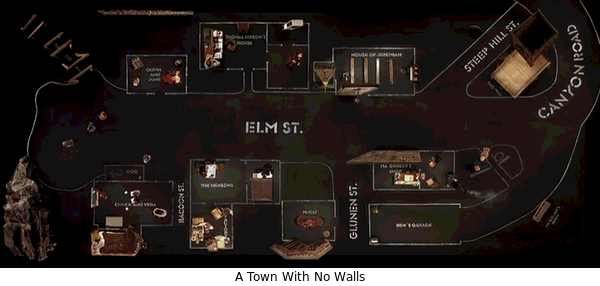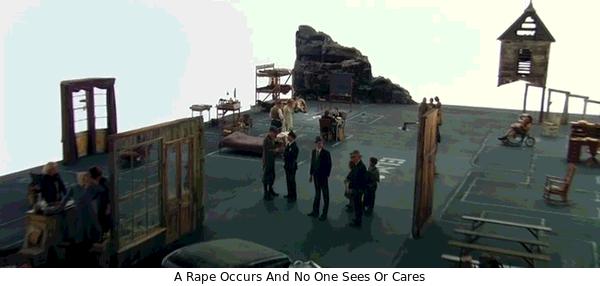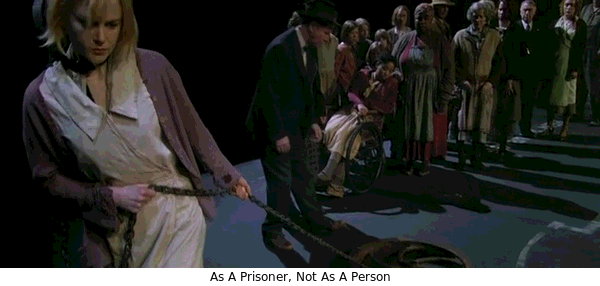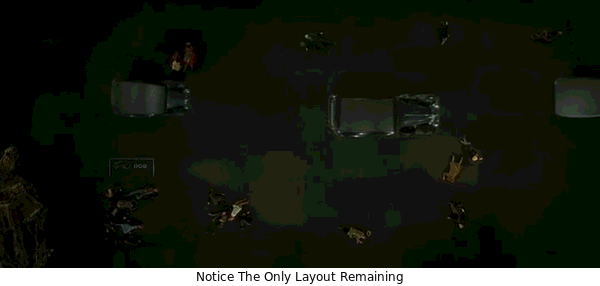Dogville
Dogville removes superfluous walls to examine moral actions
Dogville (2003) is a unique yet difficult film to watch. Aside from using three hours and nine chapters like Quentin Tarantino's The Hateful Eight. It presents a town with no walls but only a chalk outline akin to an architectural blueprint. A town that is bare of superfluous details such as walls and trees and roads and fence, just the space where people live.

I like director, Lars von Trier, and his other work Melancholia for tackling different issues such as depression although his camera work and visuals are somewhat stagnant. To compensate for the lack of visuals, it must have a strong story or compelling characters. If you have seen this and made it through, then it is for you to decide if it is.
My focal point of dicussion is on the use of the setting and how it correlates to its message. The message itself is somewhat direct with a little subversion on tropes so I won't discuss that here.
SPOILER ALERT
A Town With No Walls
The audience can see the town has no walls but the actors are confined by the space which they live in. This is akin to a stage play where everything has been stripped to the bare minimum only to focus on the actors. It is a strange setup indeed for a long and experimental film but what does it really do? You may say it is a gimick to reduce setting cost and excuse shoddy cinematography to which I might agree; however, there is a thematic reason why it is used.
At a face value, this allows the audience to see the actors behind walls. Obvious but misleading since the camera controls the viewpoint. The true value of it can be seen from this unseen and horrendous rape scene:

The audience sees the sexual assault but not the actors. Not only does this heighten the devious act, this emphasizes the distance and denial the towns people have. They are near but cannot or refuses to see what is next to them. This disonnance between what the audience and actors sees is what this setup bring.
However, it is not enough to justify it with a scene or two. To give it meaning, it must be tied to the message or story of the film. The town spiritual and moral leader is a philosopher, so this films hints at saying something moral. A critical line from this philosopher is:
The whole country would be better served with a greater attitude of openness and acceptance
Openness and acceptance. Hipocricy and denial, to be exact. By laying down the extraneous walls, the town and its people are laid bare for the audience to examine.
Reflection
After the hardships, hipocricy and cruelty the town has displayed to Grace, the judgment at the end is well deserved although you could reason more about it. More importantly, the initial decision to show mercy yet reconsider wrath instead is very appropriate. Her reasoning to be a martyr or merciful is hypocritical to what she reasons out, which the film discusses with little for me to say. The theme of self-examination runs deep.
The people themselves are deceptive in being kind at first but treat her harshly later on and deny their abuse and wrongdoing. No one is innocent specially the philosopher who merely uses words to his own benefit.

When Grace attempts to leave, no one bothered asking what they did wrong in why should a person leave their small community. Instead, they tie her up to a proxy ball-and-chain. This film is hard to watch because of the treatment and reality of Grace, which might happen to anyone. A dark interpretation of human morality.
Going back to our setup, aside from the town's ironic geographic emotional size, it reflects how little in the town really matters. Since majority of the details could be removed even the dog, there is little to care for about the town and by extension its people.

In a way, this supports Grace's decision to remove this morally deceitful town. Notice the one that remains after the massacre is the unknowing and pure dog. It goes a bit more abstract.
Abstraction
GRACE: Why not just call it Dogville? TOM: Wouldn't work. No, it wouldn't work. It's got to be universal. TOM: A lot of writers make that mistake.
Finally, the philospher indicates in naming his realized book to be a universal name, not theirs furthering the meaning. However, it does raise the point why the town is called Dogville. By joining the two lines together, it indicates that the town itself is symbolic of cruelty and hipocrisy happening anywhere.
So what if we imagine transparent walls around our homes, what would it look like? Would it be just as Dogville be? If so would, that our morality and courtesy be only our advantage? This is the literal meaning of the setup, what is a world without walls? Do we want to see beyond what our minds allow like bullying, abuse or rape in society?
Honestly as a hipocrite, I do not want to see what beyond the walls. In that sense, is my morality truly a convenience? In general, is morality that transparently empty?
Obviously there is more philosophical but this is the message of the film. So in my opinion, the use of transparent walls was used to good effect. A unique setup that I won't probably see in a long time.
Conclusion
The film is pretty straightforward in its meaning although long and chatty. If you can stomach it, I encourage you to watch this gut wrenching film for its unique story and depiction of morality. As for me, it is one of my new favorite film that I cannot rewatch without effort.